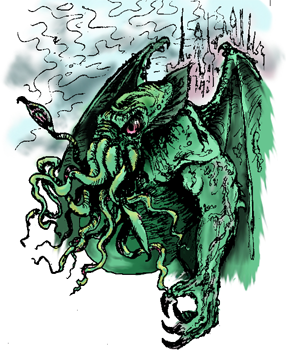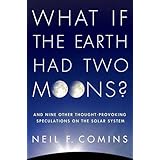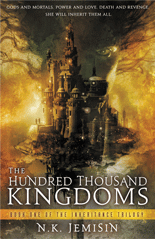New Book by Guy Deutscher
One of my favorite books on language is Guy Deutscher’s The Unfolding of Language. It’s accessible, informative, and just a lot of fun to read. Well, I just discovered that he’ll be coming out with a new one on August 31 (That’s in 2 days!): Through the Language Glass. Here’s the product description from Amazon.com:
Linguistics has long shied away from claiming any link between a language and the culture of its speakers: too much simplistic (even bigoted) chatter about the romance of Italian and the goose-stepping orderliness of German has made serious thinkers wary of the entire subject. But now, acclaimed linguist Guy Deutscher has dared to reopen the issue. Can culture influence language—and vice versa? Can different languages lead their speakers to different thoughts? Could our experience of the world depend on whether our language has a word for “blue”?
Challenging the consensus that the fundaments of language are hard-wired in our genes and thus universal, Deutscher argues that the answer to all these questions is—yes. In thrilling fashion, he takes us from Homer to Darwin, from Yale to the Amazon, from how to name the rainbow to why Russian water—a “she”—becomes a “he” once you dip a tea bag into her, demonstrating that language does in fact reflect culture in ways that are anything but trivial. Audacious, delightful, and field-changing, Through the Language Glass is a classic of intellectual discovery.
Of course, I haven’t read it yet, but I’m looking forward to posting a review. There is an adaptation from an excerpt posted as an article online: “Does Your Language Shape How You Think?”. It’ll be interesting to see Deutscher’s take on the classic debate. Can’t wait.
New World-Building Resource!
I just began reading a book that appears to have much to offer in the way of world-building ideas: What If the Earth Had Two Moons? And Nine Other Thought-provoking Speculations on the Solar System by Neil F. Comins. I’ve just finished the first chapter and even there I’ve already found the following “thought-provoking” ideas:
And this is just the first chapter! Granted, there are a number of interesting web sites in which to get similar information (e.g., World Builders), but Comins’ book provides an easily-digestible way to get the creativity flowing. He also includes new names for the alternate Earths and their moons (or lack thereof) like Dimaan (“Earth”), Kuu (“Moon”), and Lluna (the 2nd captured moon in the first chapter). He also includes brief narratives introducing each new chapter’s concepts, like a Dimaanian Galileo Galilei getting arrested by the Dimaanian Inquisition in the first chapter.
Although not a conlanging resource per se, this book has the potential to serve as a jumping off point for those who want to lend the environment in which their conlangs are spoken a firm footing in (an alternate) reality. I’m already thinking of the implications of the two quotes I mentioned above.
Fiat Mundos!
(Note: That’s supposed to be “Let there be worlds!” in Latin. I’m open to corrections ;-))
Not Conlangs, but…
I just finished reading The Hundred Thousand Kingdoms by N.K. Jemisin. Although she states clearly on her web site that “I didn’t consult a linguist to make the languages internally consistent, and I’m aware that some of the patterns of pronunciation contradict each other”, she has included some interesting con-vocabulary.
Most notably, the word esui which is defined in the book as follows: “The Darren language has a word for the attraction one feels to danger: esui. It is esui that makes warriors charge into hopeless battles and die laughing. Esui is also what draws women to lovers who are bad for them — men who would make poor fathers, women of the enemy. The Senmite word that comes closest is ‘lust,’ if one includes the variations ‘bloodlust’ and ‘lust for life,’ though these do not adequately capture the layered nature of esui. It is glory, it is folly. It is everything not sensible, not rational, not safe at all — but without esui, there is no point in living.”
This is just one word, but it demonstrates nicely (from my perspective) the ability of invented words to convey new ideas not available in natlangs. To use a natlang example, it’s like trying to convey in English the meaning of Schadenfreude, but with a con-vocabulary the sky’s the limit.
Although not a conlanger, Jemisin does a nice job of incorporating the idea of language. Her gods (yes, gods) speak their own tongue. Knowing this language allows scriveners to manipulate reality. Different peoples in the hundred thousands kingdoms speak their own languages (although we don’t actually read any of them in dialogues).
On a completely different level, the book was an enjoyable read. The characters were interesting. The plot had plenty of twists. Overall, a thumbs-up. Just don’t go looking for a conlang.
LCK in Print!
 Mark Rosenfelder, aka Zompist, has provided one of the most helpful and comprehensive introductions to conlanging on his web site for “more than a decade”: The Language Construction Kit (LCK). Now, Mark goes one better and has created a print version of the LCK which is “four times larger” than its online counterpart. The book’s Table of Contents and an FAQ can be viewed here and is available for purchase at Amazon.com. (For a previous post on Zompist here at The Conlanging Librarian blog, click here.)
Mark Rosenfelder, aka Zompist, has provided one of the most helpful and comprehensive introductions to conlanging on his web site for “more than a decade”: The Language Construction Kit (LCK). Now, Mark goes one better and has created a print version of the LCK which is “four times larger” than its online counterpart. The book’s Table of Contents and an FAQ can be viewed here and is available for purchase at Amazon.com. (For a previous post on Zompist here at The Conlanging Librarian blog, click here.)
Limits of Language

Limits of Language by Mikael Parkvall of Stockholm University. The book is an entertaining collection of trivia, facts, and information on language, linguistics, and languages. The calendar is also an interesting collection of important dates for the field. Enjoy!
Cthulhu fhtagn, Part II
As mentioned in yesterday’s post, I’ve been playing around with the Cthulhu invocation from H.P. Lovecraft:
Ph’nglui mglw’nafh Cthulhu R’lyeh wgah’nagl fhtagn.
“In his house at R’leyh, dead Cthulhu waits dreaming.”
Here is my personal interpretation of that phrase:
- Looking at Lovecraft’s translation, it appears to me that the sentence should be read “backwards” as in Fhtagn wgah’nagl R’lyeh, Cthulhu mglw’nafh ph’nglui. Stick a comma between R’lyeh and Cthulhu for good measure.
- fhtagn then becomes a participial construction meaning something like “waiting; lying in wait (as a predator)”
- wgah’nagl becomes “in (his) house/abode”
- R’lyeh, the proper name of the sunken city, modifies wgah’nagl, making the phrase R’lyeh wgah’nagl fhtagn something like “Waiting in his R’lyeh abode”
- Cthulhu is, of course, Cthulhu, the agent of the sentence.
- Sticking to my idea of modifiers coming after their words, mglw’nafh should mean “dead”. But Cthulhu cannot actually die (at least in the human sense). Therefore, I’m making mglw’nafh mean something like “potentially active, physically inactive, dormant bodily manifestation”.
- ph’nglui on the other hand is translated by Lovecraft as “dreaming”. But we know that Cthulhu can influence humans with his mind. ph’nglui I am translating then as “active mental state” in contrast to mglw’nafh, “a dormant physical state”, but the word in some verbal state.
- Furthermore, take the words ph’nglui and wgah’nagl. Note the same consonant root in both nglui and nagl (n-g-l). Using this similarity, I’m saying that nagl refers to something “inside or within”, and nglui is an “interior mental state”. By this reasoning then, wgah’ should mean “house, abode”.
Using this reasoning then, we get:
| Ph’nglui | mglw’nafh | Cthulhu | R’lyeh | wgah’nagl | fhtagn. |
| “dreaming” active mental state (verb) | “dead” dormant physical state (participle) | (agent) | (proper name) | “in (his) abode” | waiting (participle) |
Comments?
Cthulhu fhtagn!

Cthulhu, as envisioned by the Conlanging Librarian
I don’t know how I did it, but I’ve gone several decades without reading the work of H.P. Lovecraft. Don’t ask me how or why, but I just recently “discovered” his writings and now I’m hooked…especially his stories of the Elder Gods, Great Cthulhu, the Great Race of Yith, Yog-Sothoth and his kids Wilbur and the “horror”, etc. Very cool stuff!
“But why bring him up in a conlanging blog” you may ask. The only “extensive” piece of conlanging (used in the broadest possible sense) by Lovecraft is the invocation of Cthulhu: Ph’nglui mglw’nafh Cthulhu R’lyeh wgah’nagl fhtagn which Lovecraft translated in “The Call of Cthulhu” as In his house at R’lyeh dead Cthulhu waits dreaming. There are also snippets of this language in “The Dunwich Horror” and other stories. I’m not saying that Lovecraft was a conlanger. Far from it. These phrases were purposefully put together to appear as alien and unhuman as possible. Lovecraft also talks about the Great Race of Yith’s language as a “consisting of a kind of clicking and scraping” of their “huge nippers” (“The Shadow out of Time”).
It strikes me that Lovecraft is a huge untapped inspirational field for conlangers. In searching the Internet, I did find one site with a sizable dictionary and some grammar here. Even with this work, who’s to say this is the “right” one. I’ve been toying with the Cthulhu invocation and some other snippets and having an enjoyable time trying to puzzle out some sensible syntax.
Lovecraft’s prose provides tantalizing glimpses and interesting snippets from which to formulate some naming languages or simple dialogue. If you’re a conlanger looking for a fertile field to toil in…jump right in…if you dare. Cthulhu fhtagn!!
New Book Added to Sci-Fi
I came across a new “old” book recently and have added it’s Google Books page to the Sci-Fi section of TCL. The book is by Frederick Spencer Oliver and was published originally in 1894. The Atlantean or Poseid language is featured in it. For more details:
Frederick Spencer Oliver
A Dweller on Two Planets or, The Dividing of the Way
[Atlantean or Poseid language]
This novel, first published in 1894, purports to be the biography of the author’s past live as an Atlantean names Phylos.
New Old Books Added
Two new science fiction novels have been added to the Books section of The Conlanger’s Library. They are both works from the late 19th century. The works have obviously affinities for the universal language movements of their time as evidenced from this excerpt: I soon found that, unlike any Terrestrial tongue, the language of this people had not grown but been made–constructed deliberately on set principles, with a view to the greatest possible simplicity and the least possible taxation of the memory. Thanks are also due to Jim Henry for suggesting the addition of Across the Zodiac for the Library! Check out Books for these and other “required reading” for conlangers.
Thanks, David P!
~:D Thanks to David J. Peterson for calling my attention to Esperanto quotes in both Thomas Mann’s Der Zauberberg and James Joyce’s Finnegan’s Wake. These selections have been added to the Quotations section of The Library. Check them out! (Mann’s work, published in 1924, may be the first mention of Esperanto in a work of fiction.)


